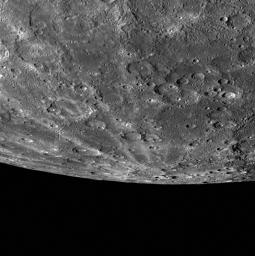A Rayed Horizon
Caption:
The rays of crater
Han Kan
cross this view of a portion of Mercury's southern hemisphere. Vincente crater is also visible near the middle left of the scene, it can be identified by its relatively smooth floor.
Dickens
(77 km in diameter) and Keats (108 km in diameter) craters are just in view near the limb.
This image was acquired as part of MDIS's limb imaging campaign. Once per week, MDIS captures images of Mercury's limb, with an emphasis on imaging the southern hemisphere limb. These limb images provide information about Mercury's shape and complement measurements of topography made by the Mercury Laser Altimeter (MLA) of Mercury's northern hemisphere.
Date acquired:
November 13, 2013
Image Mission Elapsed Time (MET):
26656707
Image ID:
5189173
Instrument:
Wide Angle Camera (WAC) of the Mercury Dual Imaging System (MDIS)
WAC filter:
7 (748 nanometers)
Center Latitude:
-60.00°
Center Longitude:
221.4° E
Resolution:
653 meters/pixel
Scale:
Vincente crater is 108 km (67 miles) in diameter
Incidence Angle:
67.7°
Emission Angle:
68.0°
Phase Angle:
63.0°
Background Info:
The MESSENGER spacecraft is the first ever to orbit the planet Mercury, and the spacecraft's
seven scientific instruments and radio science investigation
are unraveling the history and evolution of the Solar System's innermost planet. MESSENGER acquired over 150,000 images and extensive other data sets. MESSENGER is capable of continuing orbital operations until early 2015.
For information regarding the use of images, see the MESSENGER
image use policy
.
Cataloging Keywords:
| Name |
Value |
Additional Values |
| Target |
Mercury |
|
| System |
|
|
| Target Type |
Planet |
|
| Mission |
MESSENGER |
|
| Instrument Host |
MESSENGER |
|
| Host Type |
Orbiter |
|
| Instrument |
Mercury Dual Imaging System (MDIS) |
|
| Detector |
Wide Angle Camera (WAC) |
|
| Extra Keywords |
Crater, Grayscale, Radio |
| Acquisition Date |
|
| Release Date |
2014-01-20 |
| Date in Caption |
2013-11-13 |
|
| Image Credit |
NASA/Johns Hopkins University Applied Physics Laboratory/Carnegie Institution of Washington |
| Source |
photojournal.jpl.nasa.gov/catalog/PIA17920 |
| Identifier |
PIA17920 |

 Planetary Data System
Planetary Data System
